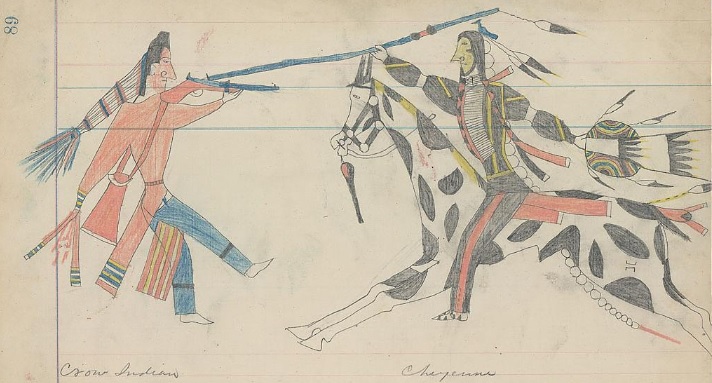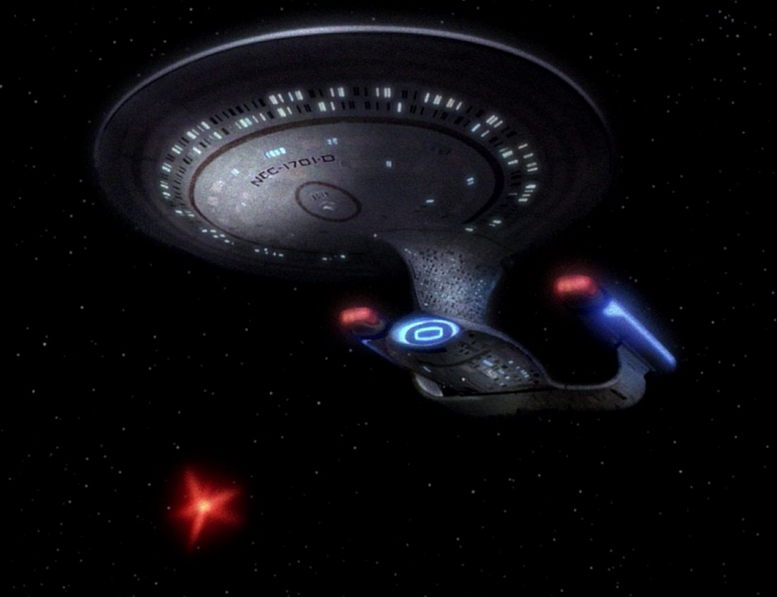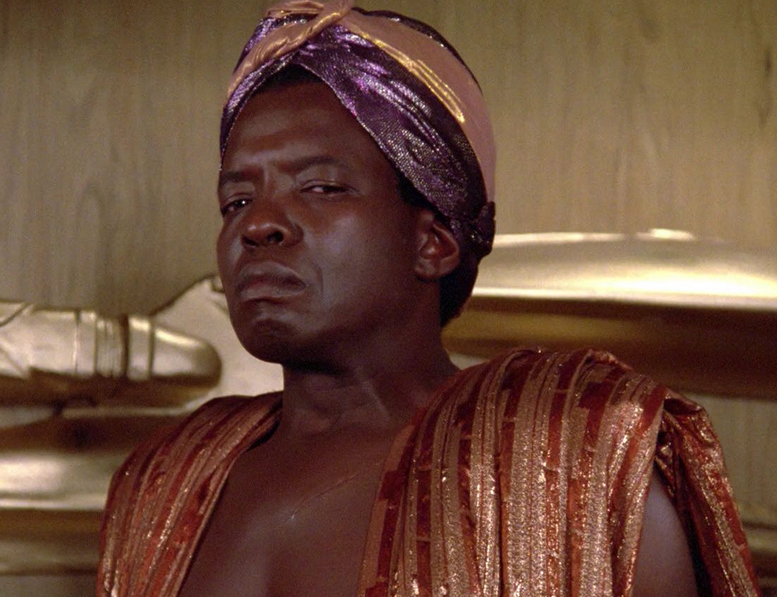
In this episode, the Enterprise travels to a Ligon II to negotiate for a vaccine that is desperately needed elsewhere, and for plot reasons is impossible to replicate. Picard and the crew entertain Lutan, the planet’s head honcho, onboard the ship. They all have a great time. They joke around. They visit the holodeck. They exchange gifts. Then Lutan ruins the whole vibe by deciding he’s taken a fancy to Lt. Yar, and kidnaps her back to the planet. There’s always that one jackass who ruins the party for everyone, isn’t there?
The rest of the story involves Picard trying to diplomatically resolve this issue – to get Yar back and obtain the vaccine – all while staying respectful to the aliens’ culture (apparently kidnapping people is kind of a thing there).
There are several strong themes in this episode – like respecting other cultures, and using intel to learn about your opponent. But the main theme of course revolves around honour and pride. The Ligonians’ whole culture is heavily influenced by their code of honour. If Picard wants the vaccine, he needs to act in accordance with this code, so as not to offend anyone.
The folly of pride

Picard and the crew learn that in Ligonian culture, kidnapping is a demonstration of bravery. They compare it to practices in native American cultures called a counting coup, which involves showing bravery and trying to intimidate or humiliate an enemy, without actually harming them. On such way was to touch an enemy with a thing called a coup stick, and then get away unscathed.
Customs like this exist because of an inherent understanding of human nature – to hurt someone’s pride can sometimes hurt more than physical pain. So these customs develop. They are a bit like games – formalised, ritualised ball-breaking.
Of course, these customs only work if everyone knows the rules of the game. Think about the coup stick thing. Warriors on both sides have “agreed” (in a sense), that if you get touched by the stick, that is shameful. You don’t want to get touched by the stick. All your warrior buddies will laugh at you. They’ll call you “stick boy”. You’ll never live it down. But, if you touch the enemy with a stick, well, then you rule the roost. You’ll be living that one up for weeks, “Hey guys, remember when I touched that loser with a stick hahahaha what a loser!!”
But think about it. If they faced an army who knew nothing of that cultural practice, would they feel shamed by being touched by a coup stick? Probably not. They might feel intense confusion, and they’d probably think you foolish, rather than brave – if you can touch me with a stick, why not a spear? I’m your enemy, why not kill me? You had your chance and you blew it. From an objective point of view – from the point of view of one not playing the game – this seems like folly.
Picard points out that with the Enterprise’s weapons, they could have flattened the whole planet if they wanted to. Lutan knew that, and he took that risk – that is, he risked the lives of his whole entire species – purely to increase his “honour”. Folly indeed.

But, that’s not the Starfleet way, of course. Although initially Picard reacts firmly, sending some strongly worded messages and a few warning shots, he later takes another approach – he and the crew opt to try to understand Lagonian culture, in order to respond effectively without conflict.
First, he learns that the Lagonians value patience, so on Riker and Troy’s advice, he decides to sit back and wait for a bit.
Then, he learns about Lagonian customs regarding kidnappings (like I say, it’s a thing there). To get Yar back, he must grovel, to an extent, and he must definitely say “Please”. He’s clearly unhappy with this – but he does it. You can imagine another, more prideful Captain refusing to suck it up and do this. But Picard swallows his pride, because that’s what he has to do to get what he wants – Yar and the vaccine. Only then is he granted an audience on the planet.

Needless to say, they find a way, and Lutan ends the episode humiliated and with a great loss of status and resources. But he stands firm, “I still have my honour!”, he says. Despite the fact that chasing honour has left him in a severely weakened position, he still clings onto it. It’s a great example of how pride can guide us towards courses of action that don’t serve us – or others.
And by the way, I would put honour and pride into the same box here. Because what is a code of honour, if not formalised, often arbitrary rules for when you should feel pride versus shame?
Sources of pride
What code of honour have you, consciously or unconsciously, adopted?
Like Lutan, Do you have a “Code of Honor”? Are there things that will make you feel immense pride if you have them, but shame if you don’t? If there are, your actions may be guided by these rules in a way that doesn’t serve you. That is, maybe they push you towards actions or situations that objectively aren’t beneficial to you. Take some time and reflect as honestly as you can. It might help to imagine you are someone else, looking back at you objectively. Are there any “coup sticks” that you trying to hit people with?
If so, where do these come from?
- Is it superiority? Maybe you should aim for more humility.
- Is it fear? But fear of what? Fear of losing status, or favour?
- Is it self-consciousness? Are you taking yourself a little too seriously?
- Are you comparing yourself to others too much?
Perhaps ultimately, the true source of pride is insecurity. If we don’t feel secure and happy with who we are, how do we feel good about ourselves? Well, if we can’t generate such feelings internally, we have to look externally. And for a social species like humans, that really boils down to how people react to us and behave towards us. If people behave in a positive way, we feel good. If they don’t, we don’t. We are at the mercy of other people’s judgements.
And since no one likes feeling bad, we naturally mould our behaviour in a way such as to encourage positive reactions from others. We start to live our lives, in perhaps subtle ways, based on the perceived opinions of others. This is the seed of pride, and it sows a poor harvest.
The first step is to recognise and acknowledge our sources of pride, our codes of honour, our coup sticks. Sometimes these will be overt. Remember, these kinds of customs only work if there are others playing by the same rules – and because of that, group membership is likely to be a common source. Religion, sports teams, professions – any group you identify with may have codes of honour that you have adopted in order to stay in good terms with that group. Objectively, are these serving you? If not, who do they serve?
Overcoming pride
Be more open about your imperfections. This might change how people react to you, it might not, but remember that it doesn’t change you. You still have that imperfection. You’re not a better person for no one knowing about it. But you might be a less prideful person for being able to admit it.
See things as they are. Quite probably, you have built up a narrative about who you are and why you are where you are. We natually try to make sense of this crazy existence. But be wary of these stories and how attached you are to them. Self-deception and pride go hand-in-hand. Try to make a more honest account of your gifts and flaws.
Admit mistakes. If you make a mistake, can you apologise for it? Why not? Sometimes, this is because of how you fear others will react. It’s true, many people are sore losers. To accept our mistakes and admit them takes a great deal of strength. Even more so when you know you’re going to get some stick for it (no pun intended). But if you think of people you admire, quite often you’ll see that they are able to do this. It takes strength to show weakness, and to show weakness can make you stronger.
Shame attacking. In some schools of therapeutic thought, people are advised to put themselves deliberately into embarrassing situations, like walking down the street with a banana on a lead, as if you’re taking it for a walk (ok that’s an advanced example). They call this shame attacking, but you could call it pride attacking. The idea is that through exposure, you learn that other people’s opinions don’t matter as much as you think. Whatever it is that you’re avoiding through pride or honour, could you try facing it?
Be assertive. Sometimes, you just have to stop going along with the rule, even if that means upsetting or disappointing some people.
Find role models. Find some people who are neither embarrassed nor prideful of the things that you are. Notice how it doesn’t affect them. That’s because they aren’t playing the same game. They are like the colonial soldiers, scratching their heads over why the braves are touching them with sticks and riding off.
Prepare for the blowback. When you work on things like this, it’s important to have tools at the ready for dealing with the blowback that they might receive. You may end up in some negative thought loops, so have some way of reframing thoughts and beliefs, like CBT, to help deal with this. There may also be social or other repercussions. Think about this and prepare for it. Always know whether the juice is worth the squeeze. Find allies if you feel you can’t go it alone.
Break toxic relationships. If you have identified a group that is forcing a code of honour upon you, and they will not accept you for not following their arbitrary rules, that is their problem. But if the blowback is toxic, you might need to cut people off.
Give yourself a break. So you’re a little prideful. No worries, you’re working on it. Even the best of us are fallible.
Use pride positively. I’ve taken a negative view of pride here, but it doesn’t have to be all bad. There might be positive sources of pride. Pride in doing good work, or pride in treating people well, for instance. Just don’t get too caught up in it. I’m sure we will return to this theme from a different perspective in the future.
Other lessons
- Smooth Talker: Lutan’s chat up line to Yar: “Your skill impresses me. I like you.” Gets right to the point doesn’t he. Although it comes from a place of arrogance, he says it completely sincerely and confidently – herein lies the power.
- A fine gift: Stuck for a gift idea? Why not try a cute little porcelein horsey, like Data gave to Lutan. Bonus points for one from 13th century China. Or was it 14th?
- Know your adversary: The crew study up on their intel on Lagonian culture, which helps them respond effectively. They are also seen carefully analysing the Lagonian weapons ahead of Yar’s confrontation, which helps Picard formulate his plan.
Just one more thing…
If they just got the vaccine, and millions of lives were at stake, why did they saunter off at a leisurely warp 3?


